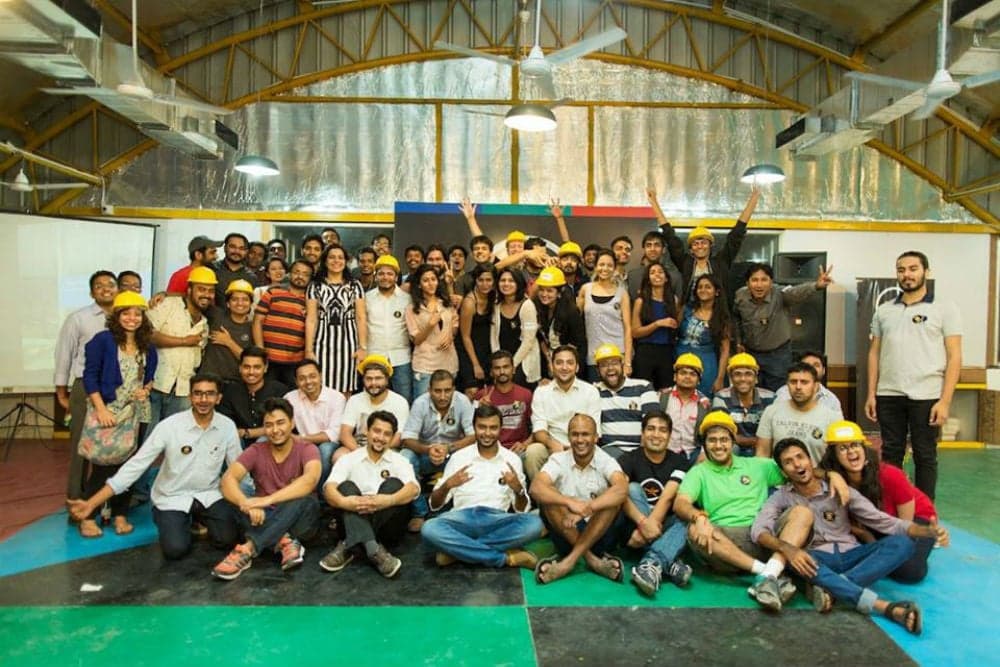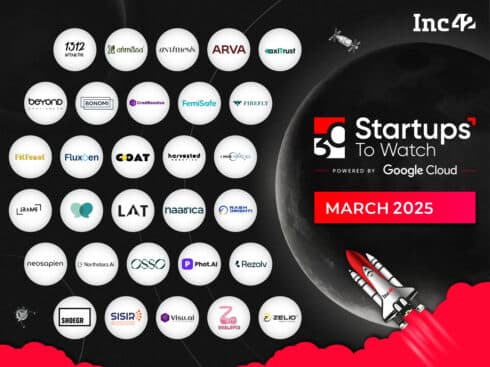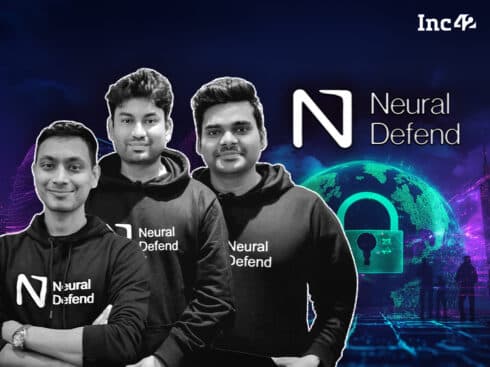“I thought I invented the term ‘coworking,’ says Pranay Gupta, one of the six co-founders of 91springboard.com with a wry smile as we settle in the cafeteria of the Okhla Industrial Estate hub. The space is buzzing with people who are grabbing lunch or playing foosball, yells and shrieks punctuating the air.
“Of course, it was only as we got into the idea of building a community of startups in India that we realised how popular the term was abroad: in the US and Europe. You’d think, from then on, it was easy to convince people to come onboard,” he adds.
Turns out, there is a little more to the story than that.
The venture was officially launched in January 2013 out of a small space in Mohan Estate, New Delhi. Almost four years have gone by and 91springboard today operates out of five major cities – Delhi NCR, Gurugram, Bengaluru, Hyderabad, and Mumbai. It also has ten coworking hubs with the latest, their largest to date, recently opened in Mumbai – a 50,000 sq.ft. space capable of housing 1,000 plus members in a thriving community of freelance professionals, idea-preneurs, and entrepreneurs.
By the fag end of Q3 2016, there were about 650 startups working out of all their spaces, housing over 3000+ members. The numbers speak for themselves and the scale of growth has been impressive, but it’s the journey of this company that has been intrepid and full of interesting bumps, and this makes the story worth telling.
Varun Chawla: Man With The Startup Bug
“It all began with Varun,” shares Pranay. “He was the one who brought us together… He has this way of roping you into work before you realise you’re hooked, and then you don’t want to leave.”
This begs the question –
What exactly did Varun say that convinced a former IIT graduate, joint CEO at CIIE Ahmedabad and spearheading iAccelerator – one of the oldest accelerators in India – to come join a startup?
The question gets answered when Varun Chawla bounds in a little later to a conference room titled ‘Hangman’ and we get a sense of his immense energy. ‘Hangman’ in this instance, of course, refers to the game that is played to fill in the blanks and come up with the answer, before all the letters of the word are eliminated – a finite time-bound brainstorming space.
“I come from an entrepreneurial family,” he begins. “And after going to college and working at my first and only job at Goldman Sachs, I wanted to do something of my own. I shared my plans with my father who looked at me very seriously and said, ‘You have your savings and you have no responsibilities right now and I am allowing you to stay at home rent-free, now’s the time to go do business.’ So I did.”
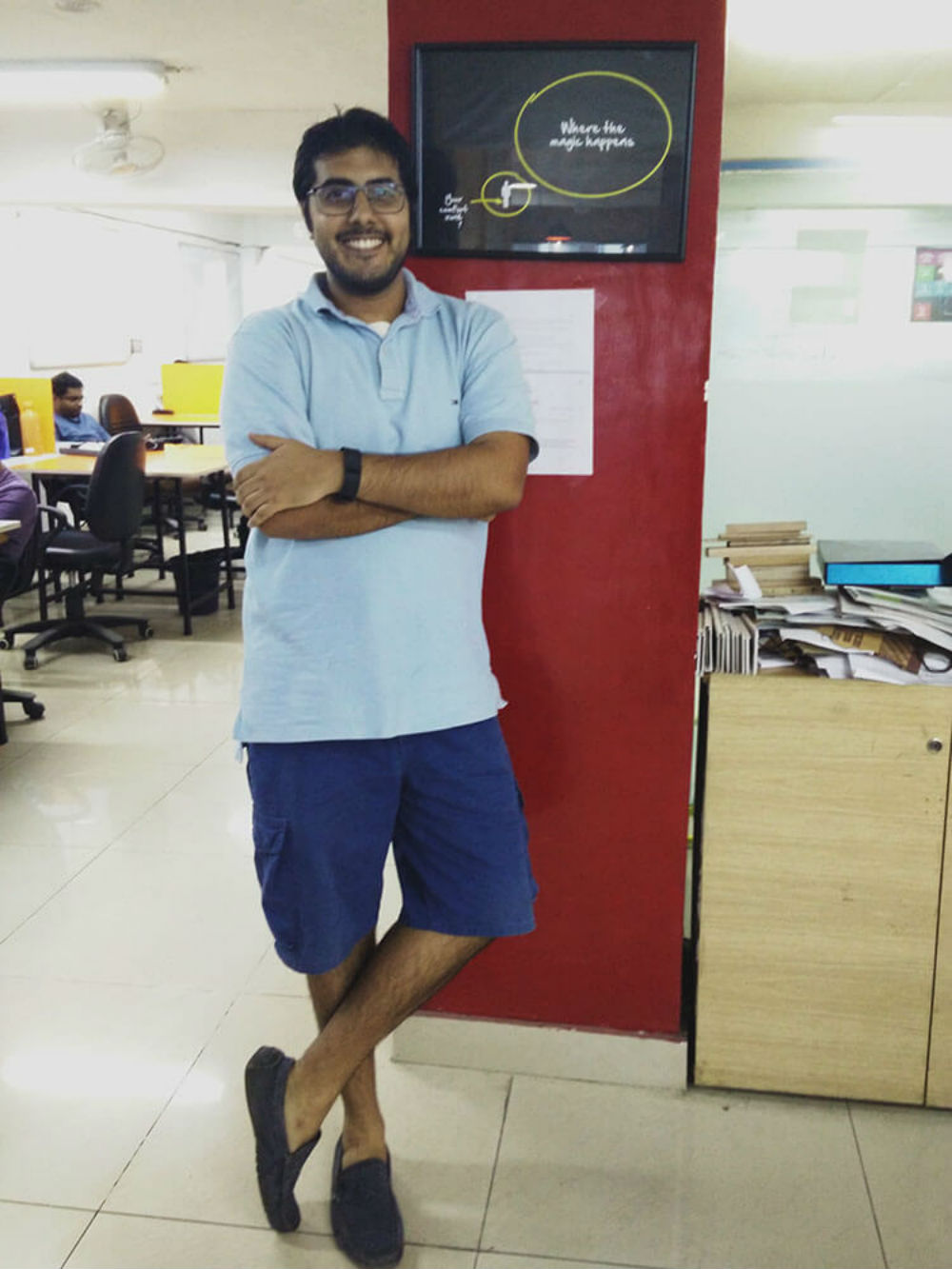 Varun Chawla
Varun Chawla
The first of many ventures, Springboard Investments, which in Varun’s own words was a “one-man army, managing investments” was launched in 2007. After the one-man army couldn’t launch a full frontal assault, Varun moved onto his next venture, Ordemus Capital, in 2008. An algorithmic hedge fund with a product “too advanced” for its time, especially considering the financial meltdown occurring worldwide during that time, this venture too didn’t taste much success.
“It did teach me a thing or two about building a team,” says Varun when asked about the lack of success of Ordemus. He then went on to launch Tyra Media Tech with Sunil Mathur in 2009, which was essentially trying to be a CDN (content data network) before the idea became crackable.
“My co-founders were interesting people,” he shares. “In fact, for one of the investor meetings for Tyra Media in South Africa, the partners were so drunk that the flight crew and I had to practically beg them to disembark.”
Varun considers all of the failures to be “experiences”. Of course, choosing the right people to go into business with, was an essential takeaway for Varun from Tyra this time around.
Leaving the Tyra debacle behind, Varun laboured on and came up with Your Personal Concierge in 2010, the idea for which he got when he was in New York and realised the tremendous amount of paperwork and legalese involved for an NRI living abroad. His startup enabled users by connecting them with professionals who would help file taxes, figure out property matters and other financial concerns in India.
Interestingly, now the Chairman of the Board of 91springboard, Deepak Sharma used Your Personal Concierge for his transactions in India from Singapore back then. “Deepak Sharma was a trusted family friend,” says Varun. “And someone whose advice I counted on immensely during my entrepreneurial journey.”
From there, it was a short hop onto building MyGuestHouse.com (aggregator of boutique hotels) in 2011, the venture co-founded with Jeetendra Arora was eventually acquired by MakeMyTrip and pivoted to become a back-end data system that provided real-time inventory to MakeMyTrip.
“By the time MyGuestHouse wound down I realised it was time to do something more, something different. Time to invest in the robust ecosystem of India,” Varun shares. And this was the genesis of 91springboard.
How The 91springboard Troika Was Formed
“Apurv Agrawal was the very first employee having joined 91springboard back in July 2012,” shares Varun. “When MyGuestHouse got acquired, I started working out of my dad’s office – starting up 91springboard, I requested Vinay Mohan, who worked at MyGuestHouse to put me in touch with some willing folks who would love to be part of a new venture. I met Apurv for the first time at Hauz Khas for a few drinks and we connected, and there was an immediate level of trust and confidence because of the party introducing us.”
 Apurv Agarwal
Apurv Agarwal
Apurv talked a couple more times and with growing comfort, he decided to come on board. After Varun, he was the first person to officially join as a founding member at 91springboard.
“In fact, Apurv was working with Varun before I even entered the picture,” continues Pranay. “He was given ESOPs and we respect him as a founding member because he gave us his sweat and blood for the time he worked with us.”
Later, Varun was joined by Pranay Gupta and Anand Vemuri as co-founders at 91springboard.
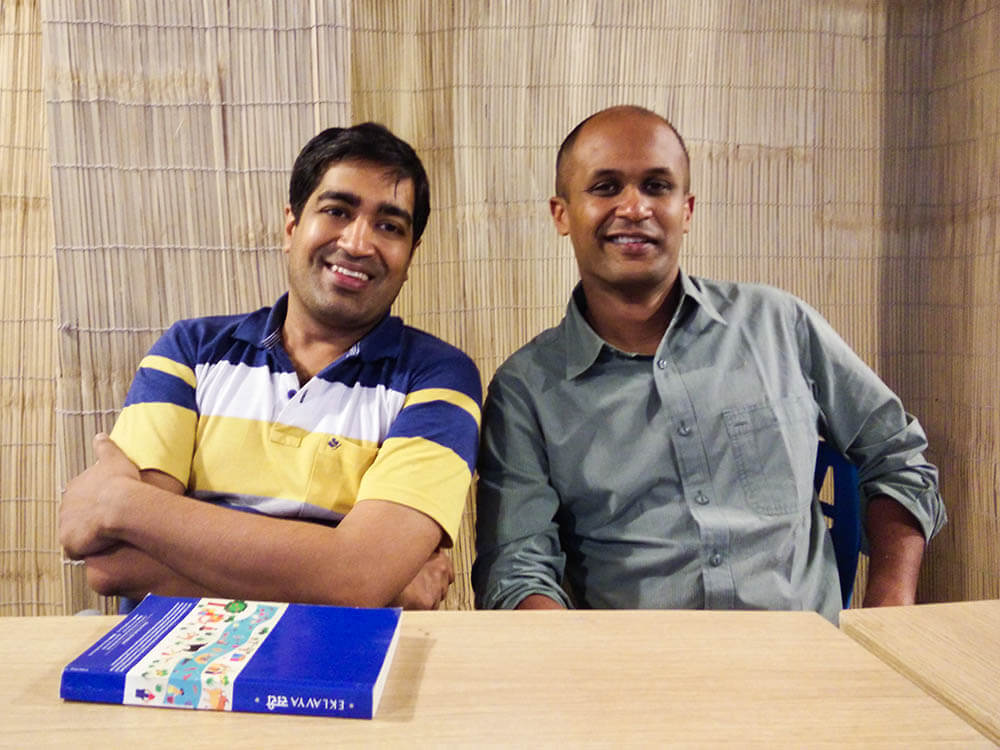 Pranay Gupta and Anand Vemuri
Pranay Gupta and Anand Vemuri
“I am a risk-averse individual,” confesses Pranay, as he digs into his standard lunch at the office – bread and egg bhurji. “I weigh the risks carefully before taking the plunge into anything. It worked for me when I was heading iAccelerator.” Startups such as Frilp, Framebench, Innoz, Almaconnect had been backed by iAccelerator, during Gupta’s four-year tenure.
“By the time my four years were up at IIM Ahmedabad (he joined CIIE in 2009) helping other entrepreneurs realise their dream, getting them funded and understanding the nitty-gritty of how to run a startup, I too got the startup itch. I wanted to get into the product side of things,” he continues. “As fate would have it, I bumped into Varun around this time and we got to talking about the idea he had of starting a fund.”
As it’s a working lunch, Anand joins the conversation while grabbing a quick lunch himself. Anand is quieter, dressed much the same as Varun. But looking at him, one can’t immediately see what would prompt him to leave behind a lucrative life in the US behind for the bump and grind of starting up.
Anand says, “I’d already worked at a startup and knew the risks involved in running one. But this was back in the US”. Anand is a graduate of Stanford University and worked at Caldera Medical for four years before taking the route back to India. “I came back home and was trying to reconnect with old friends. Varun and I caught up for a beer and we realised that I lived fairly close to where his office was. So I started getting involved, a couple of times a week.”
A couple of times a week soon turned into a full-time gig and Anand came on-board as a co-founder in July 2012. The initial idea was to launch a fund that would invest in viable startups along with a small incubator space for them, as well as for other companies.
“Initially, Varun wanted me to advise on a few things regarding the fund, take advantage of my expertise in the field,” says Pranay. “This meeting happened at Panchsheel Club around November 2012,” chimes in Varun. “That place was pivotal in founding 91springboard,” he reminisces fondly.
Pranay takes up the story again. “I started advising and finally got excited enough to take a three-month sabbatical and move my family back to Delhi. But, on day three itself, my three-month sabbatical turned into a full-time job. And the first thing we realised was that fundraising was not as easy as it looked for a small, independent startup.”
Anand expands on the problems they encountered – the tribal knowledge that was available in Silicon Valley did not exist in India at that time, neither did cliques like Startup Mafia. Simply put, there was no support system for starting a fund from scratch. Thus, there was the feeling that the incubator idea was not doing as well as they had hoped.
According to Anand, startups face a lot of problems in India, right from renting office space to proper infrastructure that needed immediate solutions. “And we had all these startups in our first location as fund-cum-incubator space, who were very happy with the infrastructure we’d provided. So we decided to go ahead with it.”
Overnight, the startup was left with no funding and an unexpected product that seemed to be working.
Varun jumps in at this point with mention of a few European investors who’d provided an initial $1 Mn that went into refurbishing and outfitting the Mohan Estate hub but, when crunch time came, they realised that an incubator-fund in an emerging economy was inadvisable and they pulled out their investment. Overnight, the startup was left with no funding and an unexpected product that seemed to be working.
91springboard.com – From A Failed PE Incubator-Fund To A Blossoming Coworking Space
“It’s all about helping startups springboard,” says Varun when asked about the peculiar nomenclature of the startup. “My first venture was called Springboard Investments and everyone liked the idea of using the new venture as a launch point for companies to grow.”
But what about 91, then?
The logic behind this was two-fold. For one, the domain name www.springboard.com was unavailable from the get-go, and the team was quite set on keeping Springboard in the name. Then they hit upon the bright idea of using India’s international calling code 91 as part of their calling card.
And thus, 91springboard.com was born.
The hub started off as a 10,000 sq. ft. incubator space in Mohan Estate in Delhi, NCR in January 2013. Once the pivot happened in April 2013, the purpose of the team was re-envisioned to building coworking spaces, they went after it with a vengeance.
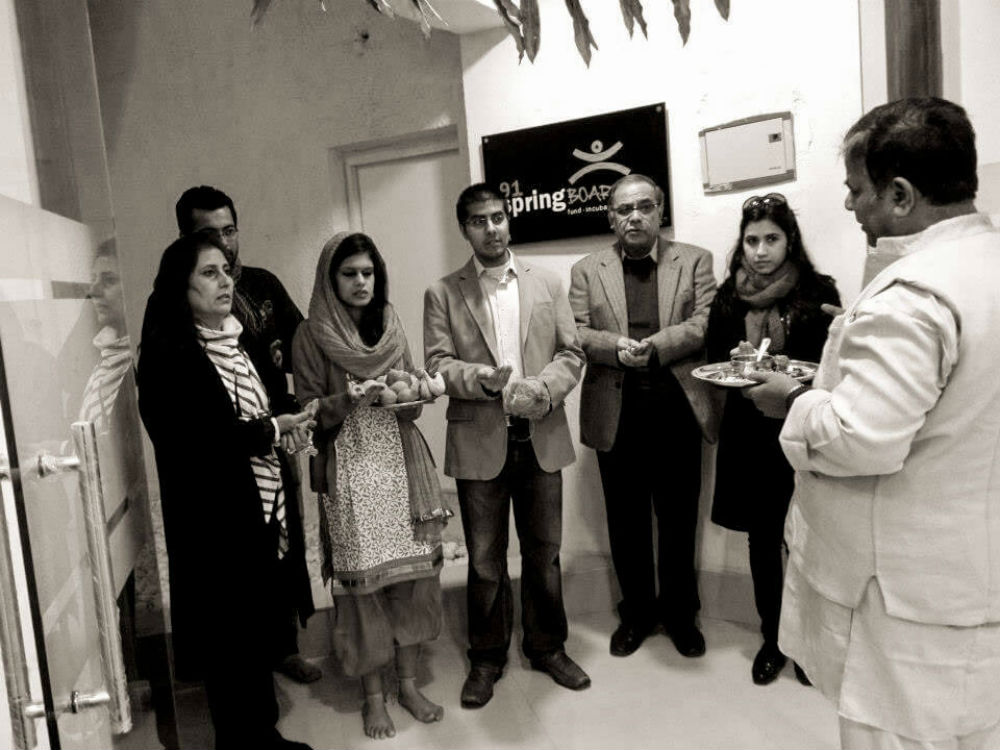
As with any product, the launch was about reaching out to as many customers as they could and they also had the tough task of finding the right kind of people to join as members. But it was a tough ask – getting the general population to understand the concept of coworking back then.
For instance, a startup would come see the facilities offered, the pricing and jump onboard to be part of the 91springboard community. But getting the startup interested in the first place when the term ‘coworking’ was just started being used in India was a chore in and of itself.
As Pranay adds with a wry smile,
How do you put “Yahaan pe feel aati hai” (this place works) into words?
But there were a few believers – such as Paperkite.in whose founder Kshitish Purohit was someone who called coffee shops his office before joining up. “One fine day I randomly received an email from Pranay – a mass mail – that he had ventured on to 91springboard and was looking to build a ‘support system’ for startups in the form of service providers, legal, mentors etc. That’s when I decided to check the place out, met Varun, and was sold on the idea of ‘having my own workspace’,” says Kshitish.
From Installing Coolers To Figuring Out Network Connectivity – Problem Solving In The First Few Months
Every startup faces teething challenges when it begins, and 91springboard was no different. “Figuring out our day to day operations may be the hardest challenge we are facing even today, as it was back then,” Anand says.
Figuring out our day to day operations may be the hardest challenge we are facing even today, as it was back then.
To this Varun adds, “Basic things such as if the toilets were not cleaned properly required minute attention from us. So, one weekend we all just showed up with cleaning supplies and made sure the bathrooms sparkled.”
What sets coworking spaces apart from regular offices is the colours and the overall vibe of how it looks like. So the design was an important issue for the team at 91springboard, that they are still trying to work out.
With Mohan Estate they had a large, open basement, the idea was to inject energy and light into space and keep things as open as possible so it didn’t seem as dark and dingy. The plan was to have a fluid aesthetic while trying to be consistent. To this end, they tried a number of combinations by hiring an architect for the first space and using their own creativity for the second one which didn’t turn out so very well. So by the time, they reached the Okhla space, the focus was very clear: hiring an in-house time and project managers to run the same.
Says Varun of the experience, “We have been experimenting with different things to see what works well and what doesn’t. The overriding thought is to not get consumed with the look or vanity of the space but rather prioritise functionality. The functionality is simply to help members engage with each other and elevate their businesses to a higher level.”
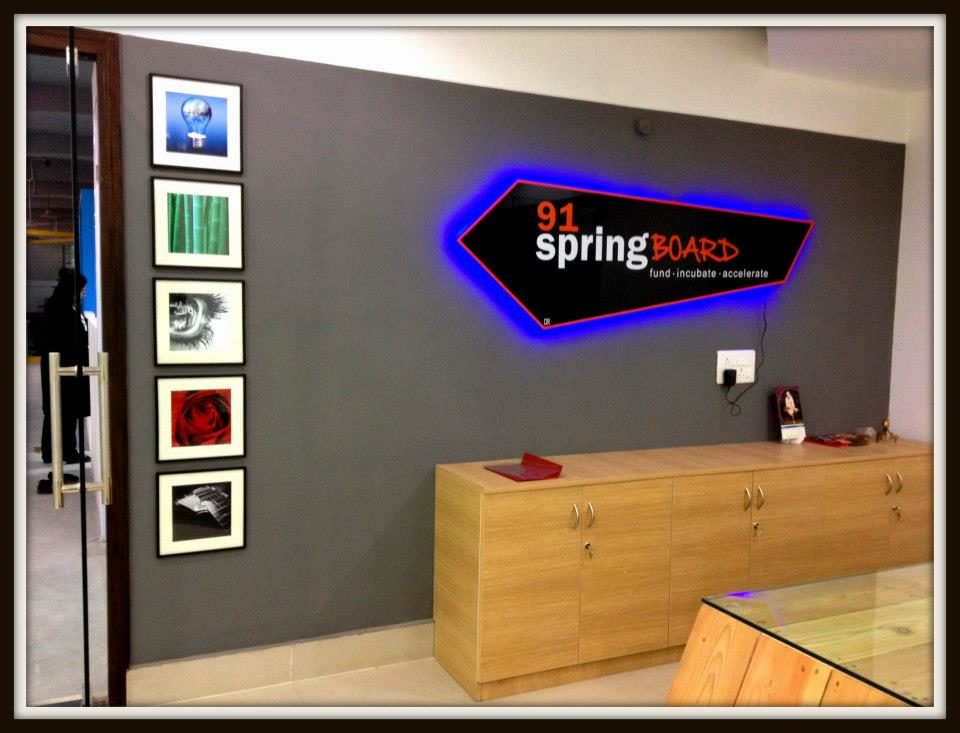
Getting a proper power supply with backup and maintaining Internet connectivity were two more on-the-job training that Anand (who manages operations) himself had in the first six months. As he recalls, “There were days when I’d be down with the engineers, figuring out which wire goes where, in the servers, in order to get the connections back up.”
Kshitish agrees with this assessment. “It is a social (socio-professional, if I may add) setting after all and will face the baggage that comes along with it. There will always be noise, distractions, disturbances – and there will always be Internet issues.”
Renuka, an independent consultant, and another initial member adds to the list of woes the team had to work with – installing coolers for combatting Delhi’s killer summer heat, switching off lights when not needed and the fluctuating power supply of course.
These are small issues, yet ones that can bring a business to a standstill. 91springboard realised the importance of correcting them early and today, they provide uninterrupted power supply and WiFi connectivity. There also are cafeterias in each of its hubs, which in the case of the Okhla hub, also has a foosball table and a kitschy schedule keeper which provides food at nominal rates along with self-serving beverages.
No Money, No Problem – How Word Of Mouth Helped Build 91springboard.com’s Community
“We had about 50-60 startups working out of the first space in the first seven months,” says Pranay. He attributes almost all of these signups to word-of-mouth, events, and referrals. “We had not much money so we couldn’t spend too much on marketing. Our ad spend was minimal.”
Overnight, the startup was left with no funding and an unexpected product that seemed to be working.
“We didn’t pay ourselves any salaries for the first few months,” adds Pranay. “It was hard going but believing in the product helped a lot. We didn’t want to be just a collection of desks and chairs. Having that vision helped too. In a way, having no money worked in our favour.”
However, they started tasting success when they had an influx of new startups coming to them. Devinder Maheshwari, co-founder of Beebom and one of the earliest members of the Okhla space came to 91springboard after an unsatisfactory outing at another coworking space. Maheshwari and a six-member team were looking for an “office-cum-home which came within budget constraints,” and catered to non-localities. It perfectly fitted the bill.
“At 91springboard, we got to use the services of fellow startups. Community matters here and we appreciated that,” he says when asked about his experience of working out of the coworking space.
Kshitish too nails the reason for why the company was able to attract so many users in the first few months itself. “I met my current founding team of three co-founders at 91springboard where we were all engaged in our respective startups/businesses,” he says. “The real value add didn’t come from the the infrastructure or the cost, or access to a plethora of services and no lock-in periods but the way interacting with other businesses turned Paperkite into DartboardIQ.”
It is hard to pinpoint the exact moment when 91springboard started showing actual PMF (product-market fit) as, in the words of Varun and Pranay, “Our timelines were little messed up as we went back and forth between Mohan Estate and Okhla.”
But in October 2013, it opened up space in Gurugram as the next bet for the company to establish the presence. Shortly thereafter, yet another space was launched in Okhla Industrial Estate – a 25,000 sq. ft. hub in the heart of South Delhi that houses more than 40 startups now.
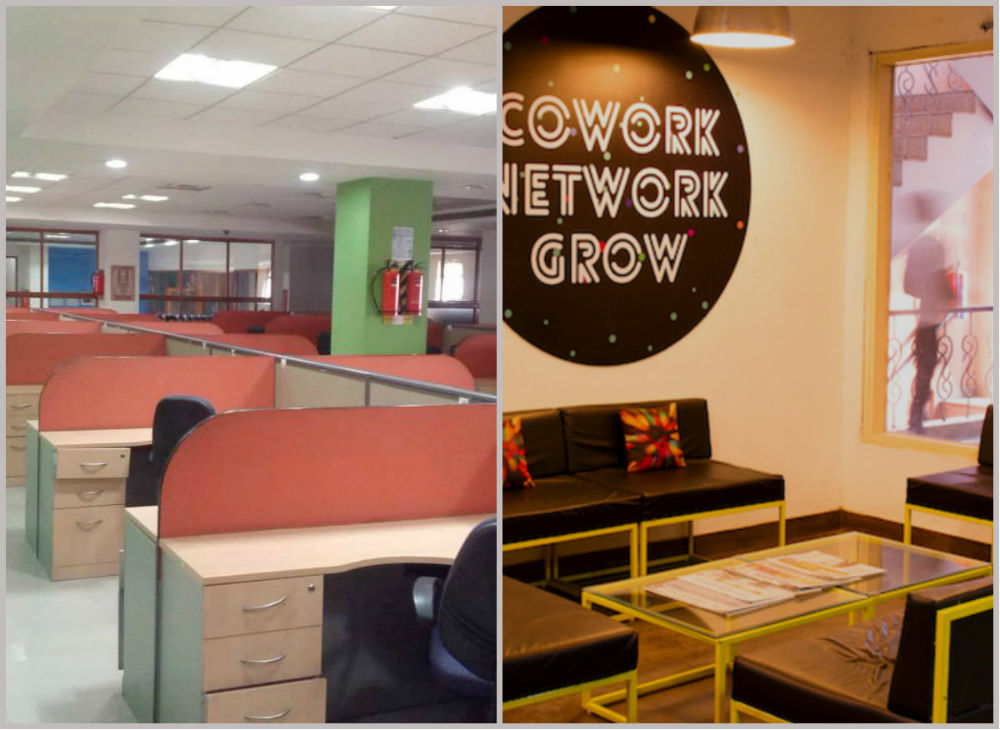
Scaling Up Requires Replication Of Process
In an Entrepreneur post, Pranay chronicles the reason for PMF happening the way it did – pouring all the money back into the venture and the right team additions shortened the gestation period ahead for each hub that opened in the first year.
According to Pranay,
It’s tough to say when we actually broke even with our Delhi and Gurugram hubs as breakeven is a moving bar. For the Gurugram hub, the first break-even was in six months and then in 12 months. We assume the average breakeven for us happens anywhere from 6-12 months.
From Delhi To Gurugram, To Hyderabad And More…
Hyderabad was the chosen location and, like before, they preferred to start small, test out product viability before moving to a larger location.
“It’s all about process replication,” says Anand. “How do we get the exact same services and infrastructure provided at one hub to all our hubs without a breakdown in the process, this was a major ask for us.”
According to Varun, the initial homework done to get the space up and running worked and it filled up in three months. This led to developing the new space at Kavuri Hills in March 2014.
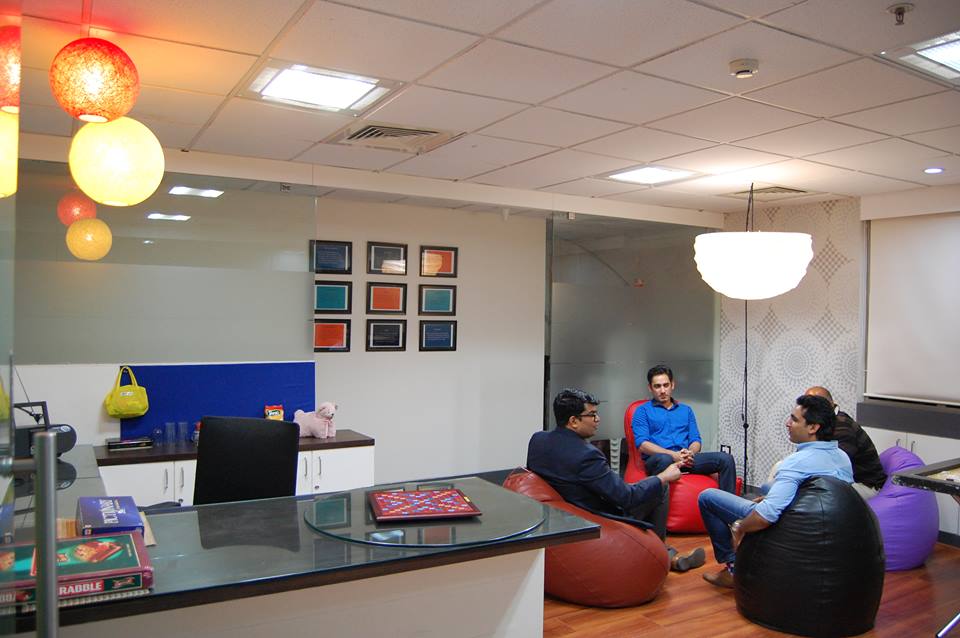
The year 2014 also brought in another milestone in the 91springboard story – ex-Chairman of Private Banking at Citigroup, Deepak Sharma came on board as an investor. While the amount that Sharma invested remains undisclosed, the troika unanimously agrees that the expertise he brings to the table is more than valuable.
Sharma had also quit his day job where he had been instrumental in building private banking for Citigroup and came onboard the startup. “We call him Super Sharma,” declares Varun. “It doesn’t matter what time of day it is, when we need queries answered (from finance to day-to-day operations), Sharma is always prompt with a call or a reply.” Sharma’s wife Susan Lim, is also Special Advisor to the 91springboard team.
The year also saw the eventual departure of founding member, Apurv Agrawal.
“He was a star when he worked with us but he always had the idea of SquadRun in his head and when he came up to us and said ‘Yeh karna hai’ (I want to do this), we thought, why not? In fact, we loved the idea so much that SquadRun is now in our portfolio,” reminisces Pranay.
When prompted to expand on what exactly ‘in our portfolio means’ Pranay is very clear that they helped the startup in a purely advisory capacity.
“In fact, Apurv met one of his future co-founders Kanika Jain, while he was working with us,” Varun adds.
The last investor Anuj Pulstya came onboard in March 2015, via Pranay’s network. He too had been helping out with the running of the space and was enthused enough to want to invest both time and money in it. “It began as an email interaction when I was at CIIE,” shares Pranay. “Anuj was knowledgeable and passionate, definitely someone we wanted on board.”
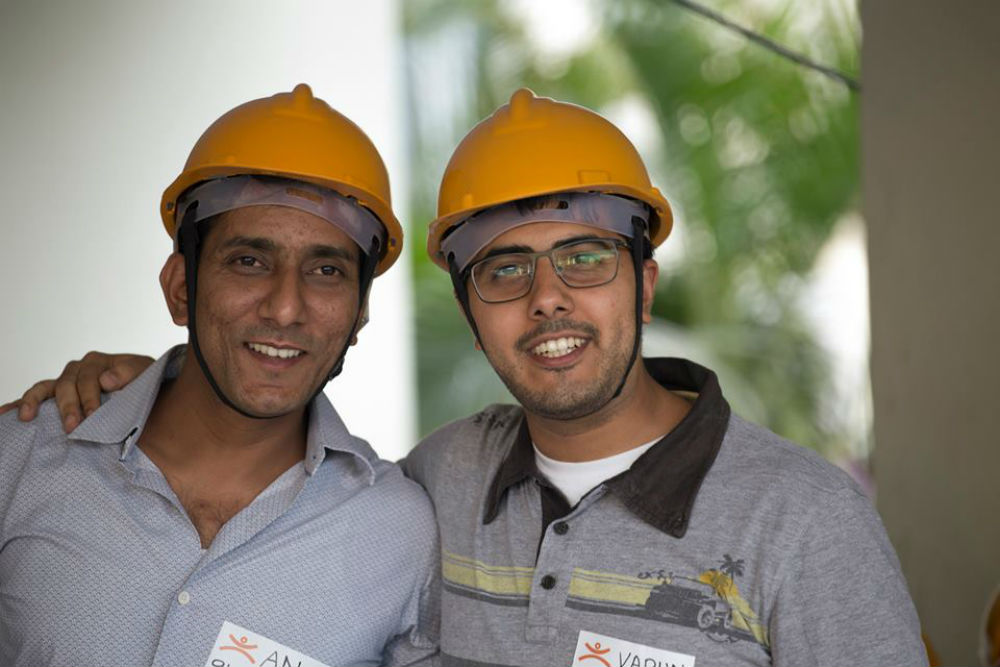 Anuj Pulstya and Varun Chawla
Anuj Pulstya and Varun Chawla
From two founding members, they have now grown to a 100 member team consisting of worker bees and evangelists, spread across each of the nine hubs who take care of the day-to-day running and operations of the spaces while the co-founders oversee and troubleshoot macro issues.
Bridging The Infrastructure Gap, Building For The Future
In the centres in US and Brazil, coworking spaces are characterised by huge open innovation areas. In such places, about 6,000 sq. ft. is the carpet area dedicated to startups while about 4,000 sq. ft. is the open innovation area.
According to Varun, “A typical 91springboard hub boasts of an average space of about 25,000 sq. ft.” This space contains meeting rooms of varied sizes for conferences and for teams to use as an office. The ratio of meeting rooms versus individual spaces was a key issue that was addressed in the initial few months. Due to these factors, space was gaining a reputation for creating a viable community of startups.
Besides, companies like Sendgrid, AWS, Rackspace, Freshdesk, Recruiterbox, Vakilsearch, Google were among the first value partners who joined hands with 91springboard in the first year of operations to offer their valuable services to the inmates of the space. And space began organising events like Big Bad Startup Bash, Reverse Pitch among others that were an extra value-add to the growing community of engaged professionals.
When prompted to ask about unit costs for the spaces, Varun replies, “We’ve always promoted entrepreneurship and have continued to do so with our cafes and vendors. Almost everything – from the furniture and IT – has been developed in house so the vendor for us is 91springboard. This is a way of ensuring the product is tailored to our needs and also keeps costs low.”
With the Hyderabad space turning profitable in three months, as claimed by the founders, 91springboard looked west to Navi Mumbai and then to Bengaluru to continue expansion. The Bengaluru hub has already sprouted two branches (one in Koramangala in August 2015 and the recently opened one at National Games Village a year later).
The first space in Mumbai is a different story altogether. It is a fintech accelerator run by Barclays and is called RISE. Situated in Lower Parel, a downtown business area in Mumbai, RISE Mumbai offers the coworking facilities of 91springboard along with the expertise and knowledge brought in by a venerated financial institution such as Barclays.
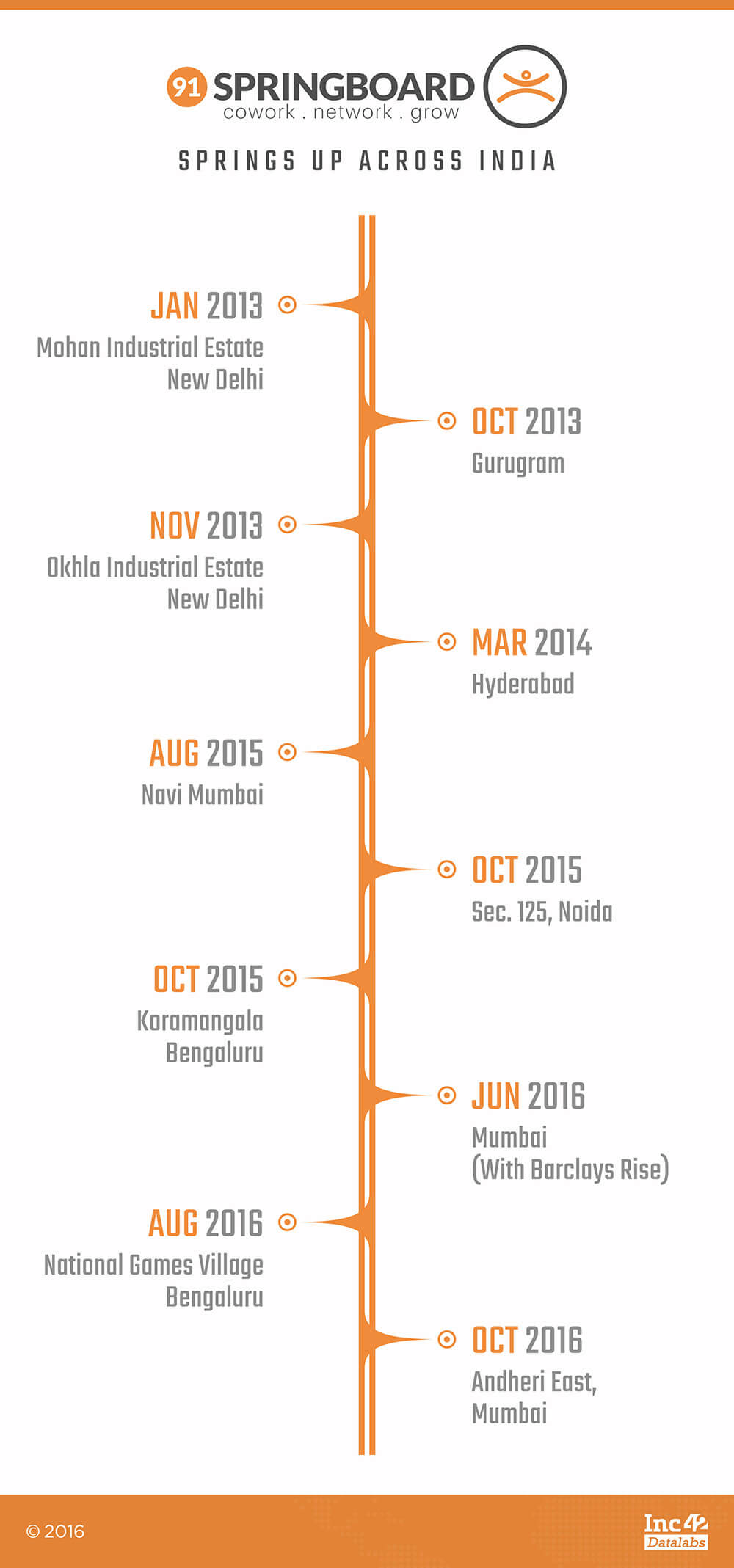
In Varun’s own words, “It’s a unique and exciting partnership with Barclays wherein we are able to provide Indian fintech startups access to a great partner in Barclays and also a global community of fintech startups in New York, London, Cape Town, Tel Aviv, Manchester, Vilnius and, of course, Mumbai. We think it’s a game changer and a sign of things to come wherein 91springboard is going to open more and more doors for businesses with a startup mindset to grow their passions.”
More recently, the accelerator housed in the space announced its first batch of cohorts that would graduate in January 2017.
quote
91springboard also opened its largest space in India at Akruti Trade Centre in Andheri East, Mumbai on October 1, 2016. As claimed by Pranay, the 1,000 capacity hub already has over a 100 signups from interested members.
Another important development was the departure of Anuj Pulstya, one of the co-founders from the company in September 2016 around the time of the new space launch, according to Pranay. “He has decided to go back and help scale up the family business. What can I say?” He smiles. “91springboard brings out the entrepreneur in us all, sooner or later.”
A Market Of 3 Mn Freelancers To Address
Competition is rife in the space. Coworking spaces like Bangalore Alpha Lab, Awfis, Innov8, Investopad, Jaaga, BHive, Nasscom’s 10,000 Startups’ Startup Warehouse and others, are jostling to fulfill the needs of the modern-day professional – be they a freelancer designer, a content writer, or a fledgling startup that is looking to save up on unit economics while taking advantage of an existing community of helpful professionals.
So how does it plan on dealing with their competitors?
“There are roughly about 3 Mn freelancers in India at the moment,” says Pranay. “It’s a very addressable market. And we are looking to collaborate with our competitors instead of competing with them, as the market is big enough for all of us to exist.”
It has also raised an undisclosed amount of funding from Khattar Holdings, ThirtyThree Investments in August 2016. Deepak Sharma, angel investor Soumitra Sharma, and Global Head of Corporate Finance at Standard Chartered Bank Sumit Dayal also participated in the round. Pranay states in an official statement that the money will be used to enhance tech capabilities, increase operational efficiency and community building.
With this in mind, 91springboard has launched its next vertical – 91university, a particular brainchild of Pranay. “While doing events at our hubs, we realised that people are craving for knowledge which is more practice-oriented and which comes directly from people who are working in real industries. This evolved into 91university where the whole focus is the same.”
According to the website, 91university’s goal is to “to help and create a new breed of entrepreneurs who can establish their foundation on the basis of hands-on training on practical aspects, exposure to industry stints and the knowledge of how to overcome entrepreneurial challenges by creating an interactive environment.” To this end, they have created a Foundation Course for Entrepreneurs that aims to take on the task of teaching participants the basics of turning entrepreneur.
From Expanding To SEA To Raising More Funding And Even A 91springboard Mafia…
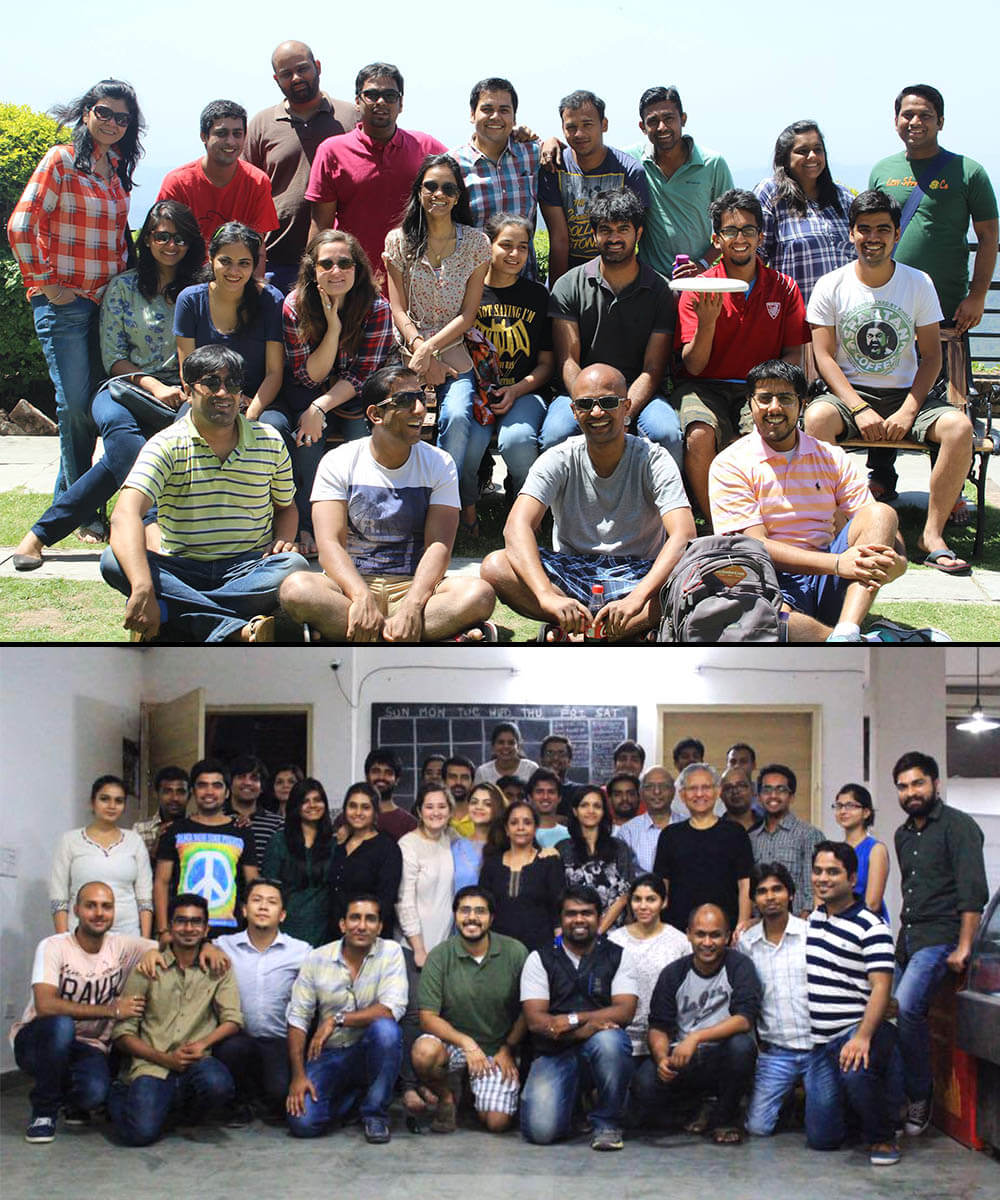
Of course, talk inevitably turns towards the future and plans for the company.
While Pranay is a bit cagey regarding actual plans, he does mention that expansion is the name of the game for the next 12-24 months. “We will be readying the hub at MG Road in Bengaluru as well as Noida Sector 1 by January 2017,” he shares.
Varun, when prompted, supplies the missing pieces. “Centres in our four core cities are profitable at the moment. And with demand being higher than supply, we want to focus on creating smaller units in the core cities. We would also like to target Pune, Chennai, Ahmedabad, and Kolkata methodically over the next 12 months.”
Financing is also another issue the team looks to tackle along with SEA expansion, which is also in the cards for the relatively young startup.
“It’s all about partnerships that really work,” says Varun. “At the end of the day, we want 91springboard to stand for retail services for aspirational global businesses enabled by tech,” he concludes.
Pranay, on the other hand, has a different take on the future he envisions for 91springboard. “Apurv left and started his own thing. As has Anuj. We have stories and stories of people joining with us and then going and doing their own thing. And they, in turn, inspiring others to do the same, will hopefully lead to something like the PayPal Mafia in Silicon Valley in four-five years. A sort of 91springboard Mafia,” he says with unabashed enthusiasm.
For a community that began purely as an answer to address this lack of ‘Startup Mafia,’ it seems like a worthy goal to aim for. Whether it will get there, and how long will it take to get there, remains to be seen.




 Fintech
Fintech Travel Tech
Travel Tech Electric Vehicle
Electric Vehicle Health Tech
Health Tech Edtech
Edtech IT
IT Logistics
Logistics Retail
Retail Ecommerce
Ecommerce Startup Ecosystem
Startup Ecosystem Enterprise Tech
Enterprise Tech Clean Tech
Clean Tech Consumer Internet
Consumer Internet Agritech
Agritech




